Image diagnoses for "Swelling"
87 results with 250 images
Results forSwelling

Vascular malformations Q28.88
Malformations, vascular: non-syndromal, mixed capillary/venous malformation.
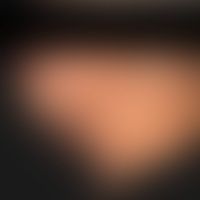
Vascular malformations Q28.88
Malformations, vascular. mixed venous/capillary malformation with predominant subcutaneous venous part.
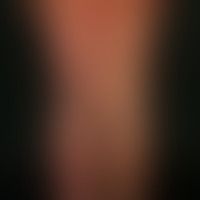
Vascular malformations Q28.88
Malformations, syndromal, vascular. mixed, syndromal, capillary/venous/arterial malformation with arterio-venous anastomoses and reactive hyperplasia of the tissue (Klippel-Trénaunay syndrome).

Cheilitis granulomatosa G51.2
Cheilitis granulomtosa: Monosymptomatic orofacial granulomatosis. solitary, chronically dynamic, recurrent for months, markedly increased in consistency, indolent, red, smooth swelling of the lower lip. no lingua plicata. no facial paresis.

Cheilitis granulomatosa G51.2
Cheilitis granulomatosa: monosymptomatic granulomatosis of the lower lip.

Gynecomastia N62.x
Gynecomastia. Enlargement of the mammae onboth sides in a 67-year-old male patient. No known underlying disease.

Lymphedema secondary I89.0, 197.2
Secondary lymphedema of the penis in cases of long-standing Hidradenitis suppurativa.
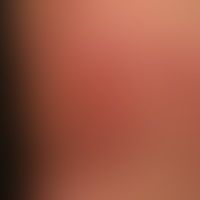
Erysipelas A46
Erysipelas, acute: Acute reddened and painful, large-area, succulent plaque, only blurredly limited, which has existed for 5 days and is accompanied by high fever; inflammation parameters massively increased.

Lymphedema (overview) I89.00
Lymphedema: chronic lymphedema in recurrent erysipelas with pronounced verrucous transformation of the skin (papillomatosis cutis lymphostatica).

Lymphedema (overview) I89.00
Lymphedema: chronic lymphedema with complicative onychomycosis; positive Stemmersches sign with bulging transverse folds over the 2nd toe.

Lymphedema secondary I89.0, 197.2
Secondary lymphedema with complicative leukocytoclastic vasculitis; condition following hysterectomy and radical lymphadenectomy.
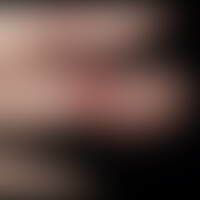
Acute paronychia L03.0
Acute paronychia: blistery, circumferential, painfully throbbing paronychia (bulla repens) that has been present for a few days, caused by poygenic cocci.

Lipomatosis benign symmetric (overview) E88.8
Lipomatosis benign symmetrical: shoulder girdle or pseudoathletic type.

Erysipelas A46
Erysipelas, acute: under high fever, , within 2 days appeared, sharply limited flat, saturated redness and plaque formation of the left buttock. accompanying: painful regional lymphadenitis.

Fasciitis necrotizing M72.6
Fasciitis, necrotizing. foudroyant running, primarily underestimated, highly painful clinical picture with high fever and massive swelling of the left hand. Patient with several years of immunosuppressive therapy.

Foot infection gram-negative L08.8
Infection of the foot, gram-negative, painful macerations on toes and ball of the foot, sharply defined, whitish maceration on the edge, spotted fibrinous and purulent towards the depth, foul-smelling, evidence of Pseudomonas aeruginosa.
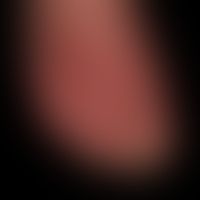
Foot infection gram-negative L08.8
Gram-negative foot infection: Dorsal side in case of gramnegative foot infection.

Herpes simplex zosteriformis B00.8
Herpes simplex zosteriformis: unpyically localized, segmentally arranged, multilocular herpes simplex of the hand.
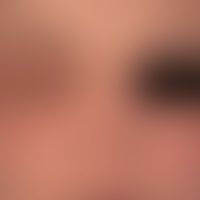
Swelling of the eyelids
Eyelid swelling: massive swelling of the eyelids in the case of known contact allergies to various cosmetics.

Swelling of the eyelids
Swelling of the eyelid: Recurrent, painless swelling of the left upper lid (always) in Melkersson's disease - Rosenthal's syndrome
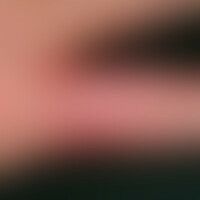
Nontuberculous Mycobacterioses (overview) A31.9
Mycobacteriosis atypical: chronic, red, in the center verrucous, otherwise surface smooth, blurred, painless plaque. aquarium owner.
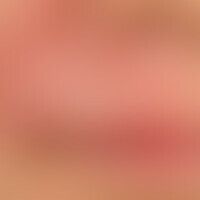
Cheilitis granulomatosa G51.2
Cheilitis granulomatosa. 3-year-old disease symptoms. solitary, chronically dynamic, initially variable, for half a year permanent, clearly increased in consistency, indolent, red, smooth swelling of the upper lip and the adjacent cheek areas. no lingua plicata.

Melkersson-rosenthal syndrome G51.2
Melkersson-Rosenthal syndrome (monsymptomatic form; here Blepharitis granulomatosa): initially recurrent, now permanent swelling of the left upper lid; no lingua plicata; no neurological symptoms.

